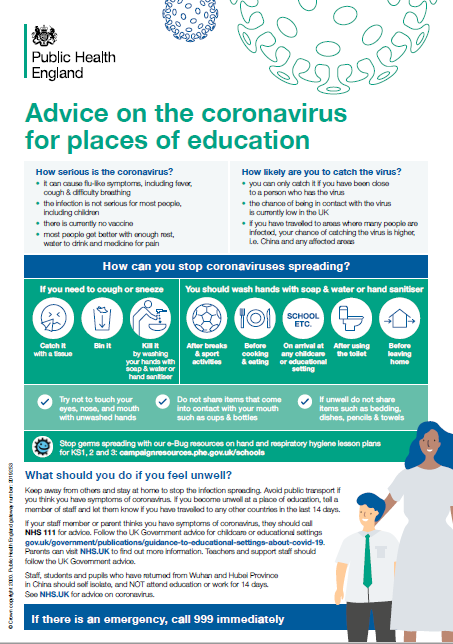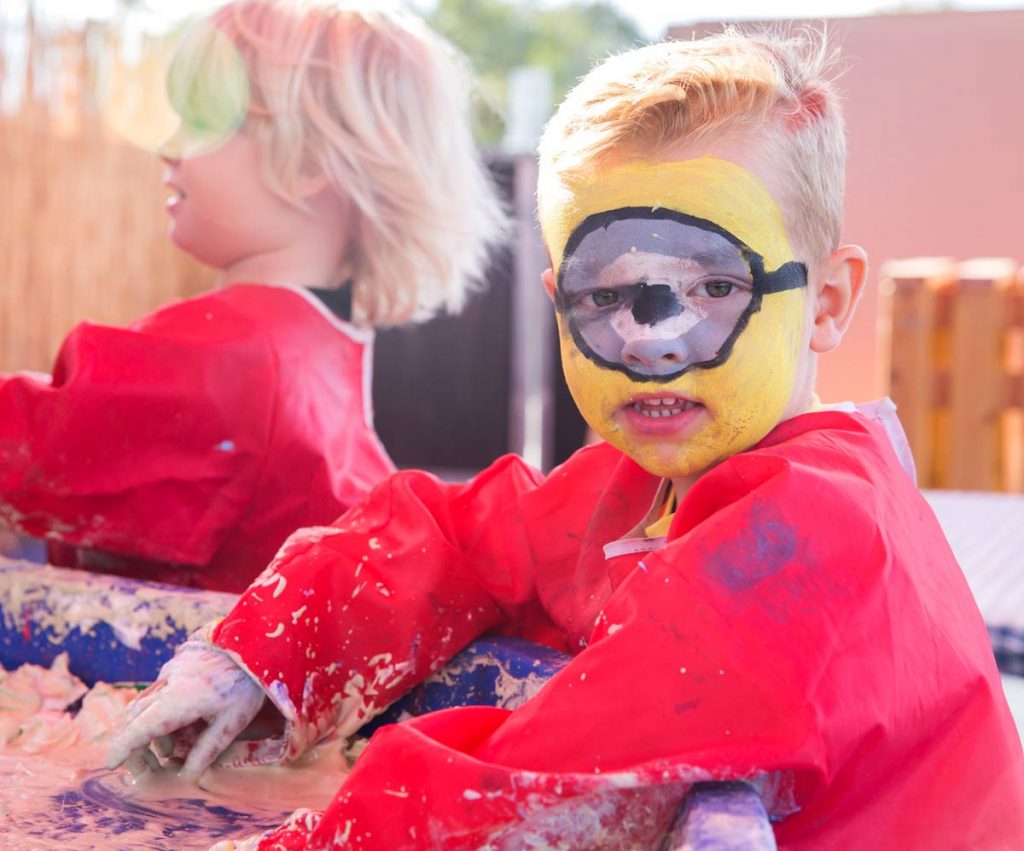Dear parents,
Below is important information regarding Akrotiri School’s position with the Coronavirus (COVID-19). We continue to follow the British Government recommendations for educational settings, direction from DCYP, military Command and the medical team.
As of today, 28 February, we ask that you comply with the following:
1. If your child or a staff member has returned from Category 1 specified countries/areas in the last 14 days, you should self-isolate. This means your child should not attend school until 14 days after they have returned from the country/area. If this is the case, please contact the school office.
2. Any child or staff member who has returned from Category 2 specified countries/areas in the last 14 days, are advised to stay at home if they develop symptoms. If this is the case, please contact the school office. If no symptoms develop, pupils or students and staff should continue to attend school.
3. Irrespective of any travel anywhere in the world if you or your child feel unwell your first action is to keep your child at home and if required seek medical advice. This is a parent’s responsibility.
For parents who would like more information about COVID-19 and the British Government’s advice to schools can access this on the following link
There are several additional things that we can all do in order to help prevent the spread of respiratory viruses, including:
- washing your hands often – with soap and water, or use alcohol sanitiser if handwashing facilities are not available.
- covering your cough or sneeze with a tissue, then throwing the tissue in a bin. See Catch it, Bin it, Kill it
- people who feel unwell should stay at home and should not attend work or any education or childcare setting
Pupils, students, staff and visitors should wash their hands:
- before leaving home
- on arrival at school
- after using the toilet
- after breaks and sporting activities
- before food preparation
- before eating any food, including snacks
- before leaving school
- avoid touching your eyes, nose, and mouth with unwashed hands
- avoid close contact with people who are unwell
- clean and disinfect frequently touched objects and surfaces
While I appreciate that several parents have become anxious it is really important that we all reassure the children. You may find the following guidelines helpful in managing conversations at home:
Stay Positive: Remember to keep calm. If you show anxiety or fear, your child will pick up on this and also feel nervous and afraid. Changes to the environment and routines can create unease. Having calm, panic-free discussions can ease emotions around these changes. Check-in on how your child is feeling and acknowledge and address their worries rather than ignore them.
Stick to the facts: It is important to have thoughtful conversations regarding the Coronavirus to distil anxiety, worry or fear. Look at the facts. Consider your child’s age, processing, and emotions to determine how to frame these conversations to ensure your child understands. If they have additional questions you can look to find the answers. Check-in on what your child is thinking and address their worries. Discuss that not everything they hear or see is real. It can also be comforting to be reminded that doctors around the world are looking for ways to address the Coronavirus and highlight positive news as well
Consider Media Consumption: When looking online, consider the source and fact-check to prevent fake news, and think before you share. Be mindful of how much media you are checking and minimise how often you are reading stories. Try to keep a healthy balance (both online and offline) in your daily routines and lifestyle
Eliminate stigma: It is important to be aware of how the coronavirus is explained to your children to avoid any person/group being blamed. Also, to communicate that if someone has a fever or cough does not mean this person has the coronavirus.
To reiterate, please be assured that the safety and wellbeing of our community is of the utmost importance and we continue to monitor the situation closely.
If you have any questions or concerns, do not hesitate to contact us.
Best wishes,
Ben Turner
Headmaster

Emergency Contact Details: Please make sure that the School Office has up to date phone numbers so that you can be contacted in the unlikely event of an emergency.
School Nurse
The WSBA schools have a School Nurse, who regularly comes to school and carries out routine checks on children at various stages of development, just as in the UK. Normally these are eyesight, hearing and growth checks, for which parents do not need to be present. Occasionally a medical is required, and parents will always be invited if this is the case. FS2 screening visits by both the School Nurse and Speech and Language specialists take place in the Autumn Term each year. You will need to be present and will receive a written invitation to the screening from the appropriate professional.
Dental Inspections
It is parents’ responsibility to have their children’s teeth regularly inspected at the Station Dental Centre. The school, in co-operation with the Centre, may be asked to send reminders home to parents if they have not taken their children for quite a while. Children can be collected from school for check ups and returned to school afterwards.
Medical Conditions
It is important that you notify us upon registration if your child has a medical condition. The class teacher does need to be informed so that a watchful eye can be kept. Medical confidentiality is always maintained.
Medicines in school
Class teachers are not permitted to administer medicines to children in classrooms. If a child needs to take a prescribed controlled medicine whilst at school, this should be arranged with the main school office, who will complete the necessary paperwork and keep the clearly named medicine in a secure area.
Accidents/Illness at school
Sometimes children have minor accidents while at school. If this is the case then they will be given first aid by a qualified first-aider. An assessment is made to decide whether they should stay in school or if their parents should be contacted.
Sometimes, particularly for bangs on the head, a note will be sent home with the child asking parents to keep an eye out for concussion. If a child is feeling unwell before school, they should not be sent in.
Dental/Medical Appointments
Parents may collect children from their classrooms by arrangement, if they have an appointment during school time. Unfortunately, because of our legal responsibility, we cannot allow a child to leave school on their own, and so they must be collected. Children must be signed out in the School Office before departure and signed back in on their return.
Impetigo
Impetigo, sometimes referred to as ‘Cyprus Sores’, is an infection of the top layer of skin with some bacteria. They can be quite common in Cyprus [hence their name] and mostly affect children. They initially look like a blister. The surface of the blister is very fragile and usually breaks leaving a shallow ulcer. This often becomes covered by a yellow crust. If your children get this infection, you should make an appointment to see your doctor immediately. Children with multiple lesions should not go to school, playgroup or crèche, as impetigo is highly contagious. Finally, children with sores should not swim until all lesions have healed.


